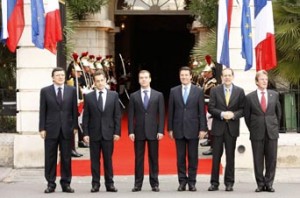Main results of the EU-Russia Summit

Nicolas Sarkozy, the current President of the European Council and José Manuel Barroso, the President of the European Commission, welcomed Dmitri Medvedev, the President of the Russian Federation to Nice on 14 November 2008 for the EU-Russia summit, in the presence of the High Representative for the Common Foreign and Security Policy, Javier Solana, Commissioner Benita Ferrero-Waldner and foreign affairs ministers, Sergei Lavrov and Bernard Kouchner.
The discussions focused mainly on Georgia, pan-European security and the international financial crisis.
With regard to Georgia, the European Union noted that Russia had fulfilled a very large part of its commitments: the ceasefire, the withdrawal, for the most part, the deployment of observers, and the beginning of international talks in Geneva. President Sarkozy emphasised the need for making progress with regard to the withdrawal of Russian forces from two specific areas – the Akhalgori valley in South Ossetia and the village of Perevi in west Ossetia. The European Union saluted the Russian initiatives towards peace in the Nagorno-Karabakh and encouraged the Russian Federation to draw inspiration from this positive action in dealing with the issue of Abkhazia and Ossetia. President Medvedev thanked the Europeans and the French President in particular for their participation in finding solutions for resolving the conflict.
On the issue of pan-European security, the European Union expressed its concern with regard to President Medvedev’s speech in Berlin and his statements on the potential deployment of Russian missiles, stating that no missiles should be deployed until the new geopolitical conditions of pan-European security had been discussed. President Sarkozy proposed holding a meeting in mid-2009, perhaps in the framework of the OSCE, to lay the foundations of what could be the future security of Europe. The President of the European Council emphasised the importance of involving the United States in this process, indicating that the NATO summit being held in April in Kehl and Strasbourg would be a perfect opportunity to prepare a summit on these issues.
With regard to the international financial crisis, President Sarkozy appraised the Russian proposals to be of high quality on the technical, financial and economic fronts. President Medvedev noted that the Russian and European positions were practically the same, underlining that the expected the Washington summit of 15 November to deliver a response that was adequate and complete, serious solutions and a programme for action.
President Sarkozy also stated his conviction that it was in the joint interests of the Russian Federation and Europe to work on the perspective of a common economic area, allowing the creation of interdependencies and common interests, thus banishing any form of confrontation. President Medvedev noted that trade between the European Union and Russia was increasing, and now represented over 50% of Russia’s foreign trade.
The European Union asked the Russian Federation to be very open in discussions with the Baltic countries, Lithuania in particular, with regard to the energy supply in the winter of 2008-2009. This request was greeted with a lot of openness by President Medvedev, indicated President Sarkozy.
President Barroso also proposed pursing negotiations on the partnership agreement between the European Union and Russia and recalled the European Commission’s support for Russia’s entry into the World Trade Organisation. He emphasised the importance of intensifying dialogue on energy, recalling that this summit had allowed clarification on certain important principles in that area, and welcomed the Russian decision to postpone increasing the export rights on certain forestry products.
